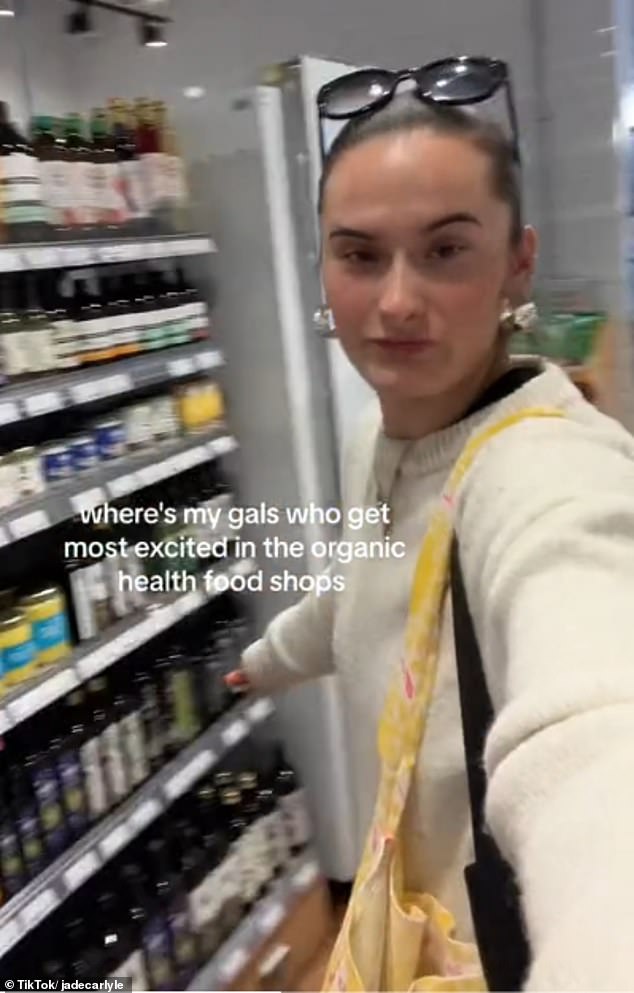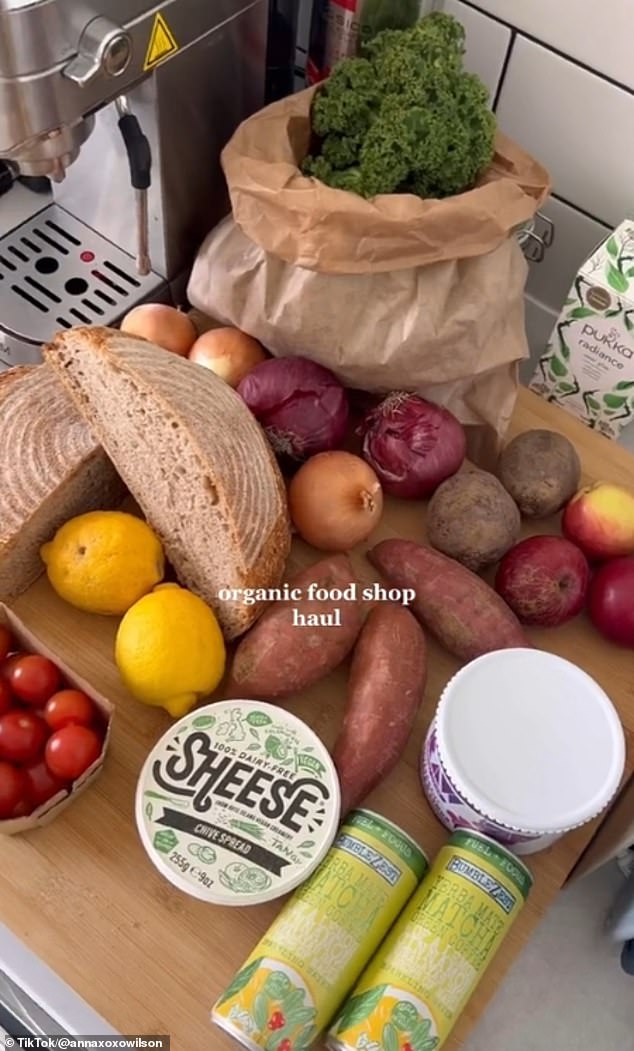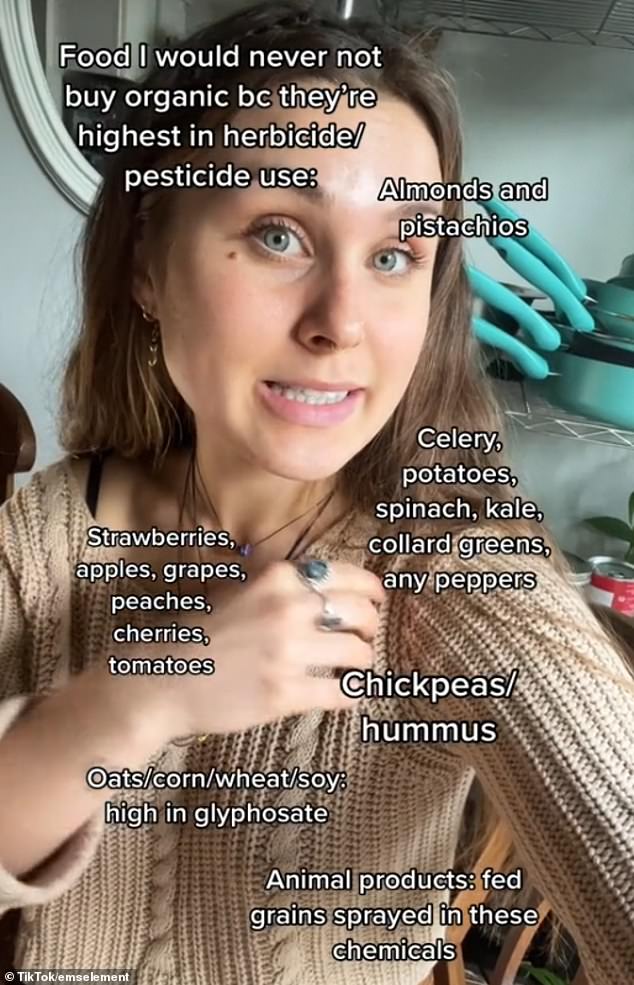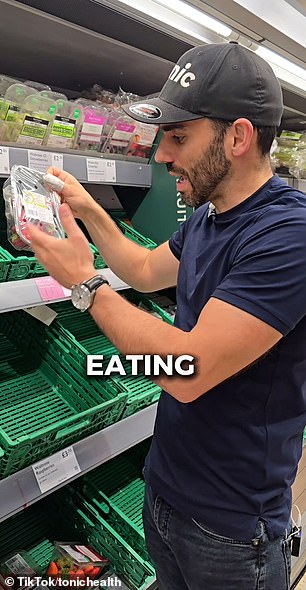Now Gen Z ushers in ‘organic living’: TikTok influencers are fuelling the trend for eco-friendly diets as study reveals nearly half of young people want healthier produce
A new study shows that millennials and Gen Z are increasingly swapping unhealthy foods for organic products.
Non-organic, pre-packaged food has long dominated the shelves of British supermarkets, with many consumers opting for frozen, canned and ready-made meals to feed themselves.
It’s a way of life that younger generations are reportedly turning away from, instead opting for organic products in the hopes of improving their health and happiness while serving the environment.
Research from Soil Association Certification found that almost half of 25-34 year olds in the UK feel happier when they buy organic food, despite rising food bills, as they believe it has a positive impact on the environment.
What’s more, researchers found that almost a quarter of all Britons feel healthier and happier when they choose sustainable options, such as organic food.
A new study from Soil Association Certification found that nearly half of 25- to 34-year-olds feel happier when they buy organic food, including TikTok content creator Donna Bartoli (pictured)
These findings are supported by an August YouGov poll, which found that 41 percent of adults said environmental sustainability has a significant impact on their food purchases.
Researchers from the Soil Association surveyed over 2,000 adults in the UK and found that younger generations, particularly those aged 18 to 34, are leading the change.
More than 20 percent of 25-34 year olds consider factors such as health benefits, sustainability and reduced packaging as essential, rather than optional extras or ‘nice to haves’. This is down to just 9 percent of those aged 65 and over.
While standards vary around the world, organic food contains fewer pesticides, additives and artificial preservatives, uses fewer antibiotics in production and does not contain genetically modified ingredients.
Niamh Noone, Senior Organic Advisor at Soil Association Certification, said: ‘It’s great to see younger generations increasingly choosing organic, for their health and for the planet.
‘Organic choices play an increasingly important role in helping people live healthier and more sustainably.’
The organic market has been in steady growth for 12 years, with the Soil Association predicting a two per cent growth in 2023, reaching £3.2bn by the end of 2023.
There is a lot of debate about whether organic food is better for your health. Some argue that it contains more natural antioxidants that help fight inflammation in the body, while others argue that there is no evidence that organic food is healthier than conventionally grown options.

Jade Carlyle (pictured) from London said she gets ‘most excited’ when browsing the shelves of organic health food stores

Aberdeen content creator Anna Wilson showed off her ‘organic food haul’ (pictured) to her TikTok followers
The movement has gained a huge following on TikTok, where millennials and Gen Zers are keen to show off their weekly supermarket purchases full of organic produce.
British health and wellbeing influencer Donna Bartolo revealed her weekly shopping and then asked her followers: ‘What’s in your shopping cart this week?’
She said: ‘I eat a whole foods, anti-inflammatories and no sugar diet. This week I did my shopping at Sainsbury’s.’
“They actually have a really good organic section,” she said, before listing her purchases, which included organic carrots, cucumbers and celery. But she added: “Sainsbury’s, you really need to do something about your plastic packaging.
She also bought other products, such as kefir, ‘wild-caught North Atlantic salmon’, organic butter beans and couscous.
Viewers shared their thoughts in the comments, with one person saying: ‘I love this content’ and another adding that the supermarket ‘looks lovely’.
Meanwhile, influencer Anna Wilson from Aberdeen showcased her ‘organic food buy’ on TikTok, filled with organic fruit and vegetables.

Emma Robles (pictured) from California revealed which foods she would ‘always buy organic’


A content creator who goes by Tonic Health (pictured) on TikTok and has over 300,000 followers shared the items he would buy organic
Elsewhere, London-based content creator Jade Carlyle, included She walked into a health food store herself and asked her followers, “Where are my daughters who get most excited about organic food stores?”
She added in the caption: “Honestly, the excitement I’m experiencing is unparalleled.”
She wasn’t the only one, viewers said: ‘100 percent me! I’m a food nerd and have been trying to avoid harmful ingredients in food for over 15 years’ and ‘I could spend hours doing that’.
California’s Emma Robles also shared a clip on TikTok about organic food, saying, “I know it’s really hard financially to only shop organic, so here are a few things I always buy organic.” Her list included chickpeas, hummus, strawberries, celery, oatmeal, and more.
Food health TikTok The content creator, who goes by Tonic Health and has more than 300,000 followers on the platform, also explained which non-negotiable products consumers should buy organic, including strawberries.
He also explained why he believes consumers may skip organic produce when paired with other produce, such as avocados. According to the content creator, the fruit’s thick skin protects the inside from pesticides.
This comes after Professor Tim Spector of King’s College London admitted he once thought organic labels (which indicate products are made without pesticides or other additives) were little more than a clever marketing ploy.
A large-scale review of 200 studies in 2012 found that organic foods provided no additional nutritional value.
However, Professor Spector, who has written three books on nutrition and co-founded the health and diet company Zoe, claimed that this was not the whole story and he has since changed his mind.
He pointed to a 2014 study in The British Journal of Nutrition, which found that organic produce contained more polyphenols than non-organic varieties.
Polyphenols are a type of natural antioxidant that fight inflammation in the body, inflammation that is linked to various health conditions.
Professor Spector explained in the Zoe Science and Nutrition podcast that polyphenols are substances that naturally protect the plant from insects and environmental conditions.
And because non-organic fruits and vegetables rely on growers to protect them with chemicals like pesticides, they produce fewer polyphenols.
“It turns out that organic specimens that are bred traditionally have more,” he said.
‘All our food is prepared for growth, size and to look good.
“But when you look at the details, you actually get less of the things you need.”
Professor Spector spoke to Zoe CEO Jonathan Wolf and admitted that the amount of additives such as pesticides and herbicides in food is monitored to ensure they do not directly cause cancer.
But whether the substances can be harmful to our health in more subtle ways in the long term is another question, he says.
Professor Spector explained that there has been minimal research in humans into the long-term damage such chemicals can cause to the body.
But these few studies have shown a weak link between these substances and serious health problems, such as cancer, infertility and ADHD. These relationships are far from proven, however.
Mr Wolf noted that buying organic produce can be “very expensive” and not everyone has the luxury to afford it.
However, Professor Spector says that eating organic doesn’t have to be expensive and that there are cheaper ways for people to incorporate organic foods into their diets.
He said people can choose organic products in their own shops, but also organic canned and frozen products as a cheaper alternative, as they spoil less quickly than fresh produce.
Professor Spector also said he wouldn’t skip buying organic tomatoes, as he eats them every day.
Breakfast cereals containing oats should be absolutely avoided, he said, because of the high levels of chemical additives.
He said oats are often grown in humid countries and sprayed with artificial chemicals such as glyphosate before being harvested and dried out.
“And because they’re wet, they absorb all that glyphosate. And so their levels are five to 10 times higher than many other grains,” he added.
Professor Spector added that there are also ways to make non-organic food a little healthier at home.
“Washing helps, but it doesn’t bring it back to the organic level,” he said.
Instead, he recommended peeling the produce or adding baking soda to it to remove potentially harmful additives.
